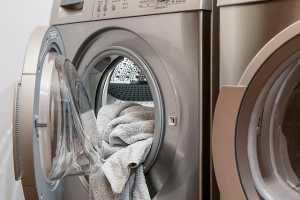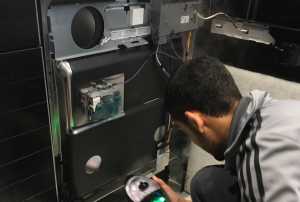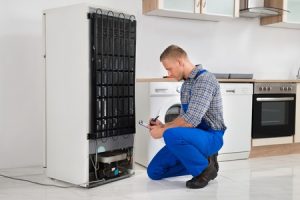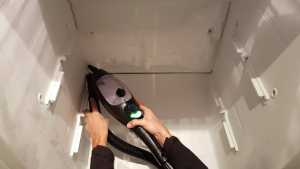Regular Appliance Maintenance – More Care Less Repair
How to extend the life of your appliances:
Your appliances work probably as hard as you do. And as with people – with appliances, a little care goes a long way. It is true that when you are taking that extra step your appliances will require less fixing and serve you much longer trouble free. After all, appliances are too much of an investment not to want to extend its lifespan.

When you are buying new appliances you want to choose the ones that are fit for the workload required of them. It is not all about their looks and shiny stainless steel appearance or trendy colors.
When you are buying washers and dryers, think about the size and frequency of the laundry, and think through your laundry needs (how many members of family do you have? Do you have a king size bed? Do you prefer to do one big load or smaller ones more frequently?) Same goes for the fridge – if your current one is always over stuffed with food, go one size up, if it is empty go one size down. Loading washer and dryer over the capacity regularly will eventually will break the engine, running your fridge on empty might cause your compressor to overheat.
Appliance maintenance & care checklist:

- Rinse dishes before putting them in the dishwasher! Most of our washer repair calls are caused by the food parts that are stuck around impeller and water drain hoses that get clogged. Inspect and clean the filters on regular basis. Sanitize and deodorize the dishwasher with vinegar or special detergent. If you have started using the dishwasher – use it every day. If you need to go away for some time – sanitize it and leave the door open.
- Clean out the lint screen from the dryer on the regular basis. This simple habit can will not only save the engine, but might prevent the risk of fire. Once the lint build up makes it inside, any electric spark might start the fire. Unfortunately, the incidence of dryer fires is high enough to take it seriously. Call professional appliance service technician once in a a couple of years for professional cleaning.
- Wipe the washer after every time you use it and leave the door open (for front loading models) – if excess moisture is left it will promote the growth of mold and damage to the rubber seal.
- Clean the condenser coils at least twice a year to remove dust and grease. Do not keep your fridge too close to the wall to allow for the proper heat exchange. Clean and inspect gasket regularly – if it loses suction it has to be replaced.
- If your electric stove still uses knobs (and not electronic panel) when you clean them – do not spray cleaner or water directly on them – wet the cloth instead to allow for the excess of moisture to keep away from affecting the electric contacts.
These simple measures will help extend the life and efficiency of your appliances and will help make them serve you well. Regular cleaning and check ups will help prevent the small problems from growing into the big ones.
7 Tips for Kitchen Appliance Maintenance
We can do a lot to extend the life of our home kitchen appliances. We’ve comprised this list tips to help you get the most out of your appliances lifespan, and your money’s worth!
Here’s how to ensure your kitchen appliances always run smoothly

However, don’t forget to always unplug your appliance before you begin any work on it. Stay safe!
- Clean Your Coils: Service experts find this issue on most of their refrigerator calls. The coils can usually be accessed through the front grille. Then, push a coil cleaning brush into the coils, pull it back and then vacuum it clean. Now, your coils will cool more efficiently!
- Don’t Overload: By stuffing your washer and dryer with clothes, you may assume that you’re saving water and energy. However, you’re actually just damaging motors and other moving parts. These repairs can rack up expensive bills, that way you’re better off buying a new machine.
- Silence Is Golden: A loud washing machine and dryer’s vibrations can easily be silenced by adding rubber anti-vibration pads to the bottoms of their feet!
- Keep The Dishwasher Clean: When your dishwasher ceases to clean your plates, usually the blame is placed on the filter being full of food. If it’s clogged, water can’t travel to the spray arms. Locate the filter in your machine, then use a wet/dry vacuum to clean off the screen.
- Don’t Slam The Doors! By dropping or slamming the lid of your washer, dryer, and even your refrigerator and stove, you run the risk of breaking the lid/door switch. Sadly, this will cost at least $100! But, this can be avoided with a gentle hand when lowering and closing the doors.
- All Things Stove: If your stove burner won’t light, its could be from spilled food. You can use a tooth brush to buff off food spills from the igniter. However, if your appliance is an electric ignition stove, it’s the little ceramic nub found under the ceramic steal strike plate. If the burner on your electric stove isn’t working, turn the burner off and pull it out of its socket. Then, plug it in and wiggle it around. If it’s loose, remove the burner again and bend the burner prongs slightly outward for a tighter connection.
- Clean Fridge Gaskets: When you clean your fridge’s door gaskets clean, it will seal properly and last a long time. However, by letting sticky foods clog up into the door, it’ll glue the frame and gasket together. Plus, by pulling hard on the stuck door, you can eventually tear the gasket. This will cost you $100 of more to fix! Also if the door doesn’t close well then the fridge will run longer, boosting your utility bill. Clean the gasket with warm water and a sponge as detergents can damage the gasket.
I-Fix Appliances is here for all of your appliance repair needs! Whether you want a second opinion or need fast, same-day service, call us! You can reach us at 647-642-1212 or on our website https://ifixappliances.ca.
How to Extend the Fridge Lifespan – Maintenance Tips

Winter is almost here and with it comes a growing hydro bill. One of the most important appliances in any home is the refrigerator. It consumes quite a bit of energy and can be very expensive to replace or repair. If you are interested to save some money by conserving energy and put off the time when you’d need to get fridge repair or replacement, we’ve got some good news for you.
With a little bit of extra care and by following a list of simple precautions, you can have the fridge run in a more energy-efficient manner and have its life extended considerably.
Here are Some Fridge Maintenance Tips
- Replace the rubber seal on the fridge door. You’d be surprised at just how much cold escapes the fridge when this seal is worn. This gasket gets brittle over time and it’s fit becomes less than perfect. A fridge can operate for over five years easily, but the gasket should be replaced every year or so.
- Keep heat away. Ovens, dishwashers and other heat sources make your fridge compressor work in overdrive, spending lots more energy and shortening its lifespan. Make sure it’s not exposed to direct sunlight, and always choose a fridge with a reflective surface.
- Dust up the condenser coils. The coils in the back or bottom of the fridge are there to remove heat from the unit, a function they have trouble with if they are dusty. Keep them clean to increase their efficiency.
- Use the in-door water and ice dispenser. Every time you use the in-door unit, you avoid opening the fridge or freezer doors, keeping the cold in. The less you open the doors, the less energy is needed to keep the temps down.
- De-clutter the refrigerator. A cluttered fridge will have difficulty working efficiently. Decent temperature distribution requires lots of space for air to flow. Avoid large bags and packaging by placing your vegetables and other items directly into the bins or on shelves. This is extra important for the top shelf.
- Keep an eye on the temperatures. Just a small turn of the dial to increase temperatures can save you lots of money while your food remains sufficiently cold. Optimal temperatures for the fridge are ~38°F and 4°F for the freezer. There’s no real need to go colder than that.
- Use the power saver mode. Not all fridges have this function, but if yours does – use it. It will deactivate the built-in fridge wall heaters that inhibit humidity. Unless you have a lot of condensation on the fridge walls, you don’t really need them working.
- Minimize frost build up. Not all fridges have this problem, but if yours does, you might need to do manual defrosting every now and again. The frost build-up can be a drag on your fridge, making it work overtime to keep its cool.
Hope this was useful! Want to know more? Need your refrigerator repaired? Your fridge repair experts are here to answer all questions you may have.
Call us today and we’ll help you right away!

